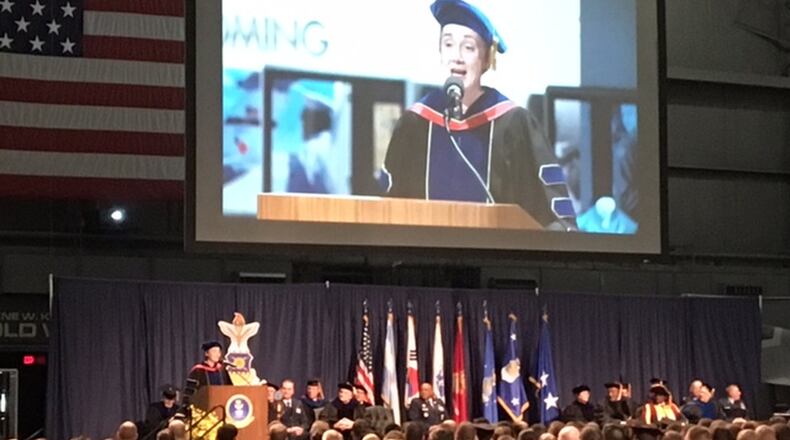RELATED: Threats will drive BRAC strategy, Air Force leader says
Among three key points of advice, the top Air Force civilian leader told graduates to be critical thinkers who challenge assumptions about why.
“You will also now serve as technical leaders and as leaders in technology and science you have to learn four important words. You have to learn to say, ‘that’s not good enough.’”
The secretary cited recent hypoxia-like incidents among pilots experiencing oxygen loss in some of the most sophisticated aircraft, such as the F-35 Joint Strike Fighter, and more basic training aircraft such as the propeller-driven T-6 Texan, as an example to keep asking why and not be pressured to cut short the search for answers.
She told graduates they should not be afraid to say no, even to superiors, until a solution is known.
Wilson told them they must also be innovators.
EXCLUSIVE INTERVIEW: Air Force leader says total dominance not a ‘birthright’
“Innovation doesn’t come from requirement statements,” she said. “There was never a requirement statement for a silicon chip. There was never a requirement statement for Uber. There was probably wasn’t a requirement statement for GPS.
“If you’re not making mistakes as an engineer, you’re probably only proving that what you already know really does work,” she said. “That’s not innovation. We need you to push the bounds of what you know.”
The high-flying, record-breaking Lockheed SR-71 Blackbird spy plane with a needle-like sleek shape demanded overcoming a series of technical problems, from aviators in space suits ejecting at extreme speeds and altitudes to heat-resistant glass that wouldn’t distort surveillance cameras view.
“The result was an air-breathing monster faster than a speeding bullet,” she said. “What would your innovation be?”
Developing trusted relationships is the third key, Wilson said.
“The work that you are about matters, and the people matter more,” she said.
EXCLUSIVE: Top Air Force general says ‘all programs are at risk’
From her time at the Air Force Academy to serving on the national security council staff, the former New Mexico congresswoman said she could count “on one hand” people she could call on at any time.
“Those kinds of relationships are built over a long period of time are priceless in your life,” she said.
The Air Force’s top leaders listen and trust each other and see things from different perspectives to address national security issues, she said.
“You have everything to gain as young officers and civilians in the Air Force to see alternative perspectives, to find your partners in crime who are going to push you and make you better because steel sharpens steel,” she told AFIT graduates.
“The United States Air Force relies on the most advanced technology to defend our nation and project power in the air and space around the globe,” Wilson added. “We’re going to lean on you. We’re going to lean hard on you as the next generation of scientists and engineers in air and space.
“So choose to ask why, choose to be an innovator, and choose to build strong relationships throughout your professional lives,” she said. “Our nation needs you desperately and future generations are counting on you.”
